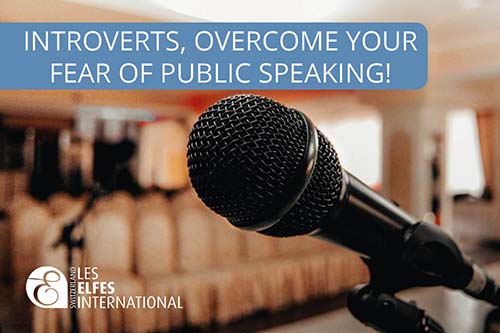Ask most introverts if they love the experience of public speaking, and the answer will most likely be no.
Public speaking is a vital skill for all professionals to master, regardless of their temperament. Even after learning how to speak in public and reading numerous tips and tricks to do it well, you might still be feeling nervous. Consider devoting some time to quieting your introverted anxiety, as well as to developing your speaking skills.
At Les Elfes camps, students are involved in speaking to the public (other campers)!
Find out Les Elfes Winter ski & snowboard camps!
1. Change How You Think about Public Speaking
For this step, use your ability to think about what other people are thinking (which is something intuitive introverts are usually very good at). With very few exceptions, audience members typically want the person who is speaking to them to succeed. They want to see an interesting or helpful presentation, and they hope you can provide one. This means they are cheering for you. They WANT you to do well because that means the encounter will be enjoyable for them too. In a way, you are simply helping people by sharing what you know or are there to present.
Once you realize your presentation has much more to do with your audience than it has to do with you, you may feel less pressure. Use your imagination (something else that introverts are typically very good at) to think about what your audience wants to learn from you. If you’re not entirely sure, either reach out to people you know you’ll be speaking to, or consult with whoever has asked you to speak. Are you there to impart technical knowledge? Are you there to inspire or entertain people? What one point do you want to make? Write it down, and start from there.
2. Plan, Practice, and Plan Some More
Sometimes the only way to quiet anxiety about public speaking is to get yourself to a point where you say, “I have prepared for this as carefully as I can. There is nothing further I can do.”
Write down your one-sentence goal for your presentation. Then map out what you want to say and when, either by writing it out, making an outline or just getting some bullet points on a notecard. Think about some exciting or intriguing ways to introduce your subject in the beginning, and re-state your goal in a conclusion.
Then, practice it. Go in a room by yourself, stand in front of a mirror, and talk to yourself like you are your audience. Practice it a lot. Try lots of different things. Change the order of your speech. Think about ways to use visual aids or illustrate the training you’re providing. Look at your hand gestures and facial expressions in the mirror.
When you’re sick to death of the whole topic and yourself, and you can’t practice it one more time…practice it one more time.
And then STOP. When you start to feel nervous, tell yourself that you have prepared even more than you probably needed to. You are ready.
3. Mingle Before the Big Event
This one is counterintuitive because if there is one thing introverts tend to hate more than public speaking, it is “mingling.”
Get to where you will be speaking or presenting early. This will help calm your nerves because it will leave you sufficient time to get ready and also check any equipment or software you might be using.
It will also put you in the place where your audience will be. As your audience members join you, greet them pleasantly. If you’re already acquainted, chat. If you’re not, introduce yourself and ask them how they’re doing and what they look forward to learning. Distribute any materials while people enter, or circulate to talk to them and give them any handouts.
This serves two purposes: it gives you something to do before your speech rather than be nervous, and it is another way to get the audience on your side. They always wanted you to do well, but now they want you to do well because they feel like they know you.
Always Be Yourself
These are just ideas to get you started. The most important thing about speaking is that you show your audience your true self. Do not adapt things that you think make public speeches “good.” Don’t tell jokes unless you typically tell jokes. Don’t mingle ahead of time if you’d rather meditate quietly for a few moments before you start. Understand what puts you at ease and go for it.
Introverts tend to be empathetic and imaginative people. You have nothing to fear from your audience, especially if you focus on how you can make the experience a positive one for all of you.
ARE YOU LOOKING FOR WINTER CAMP FOR YOUR CHILD?











